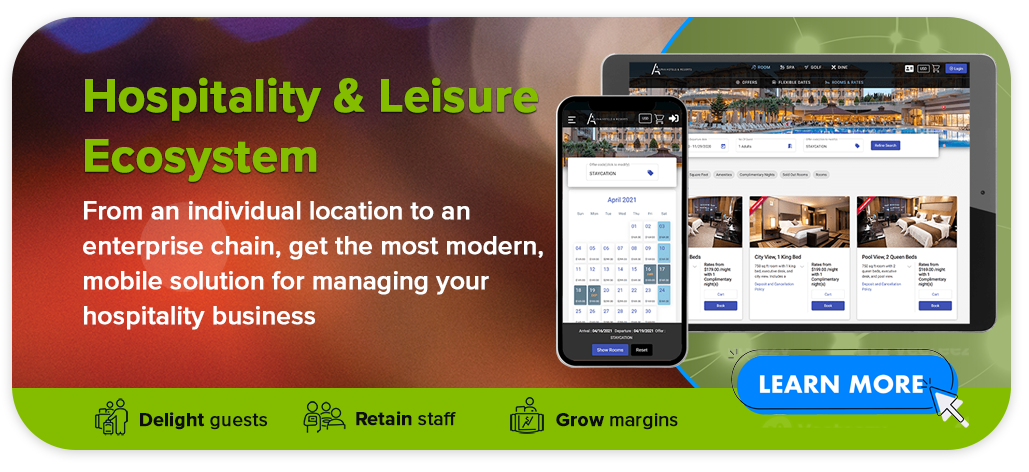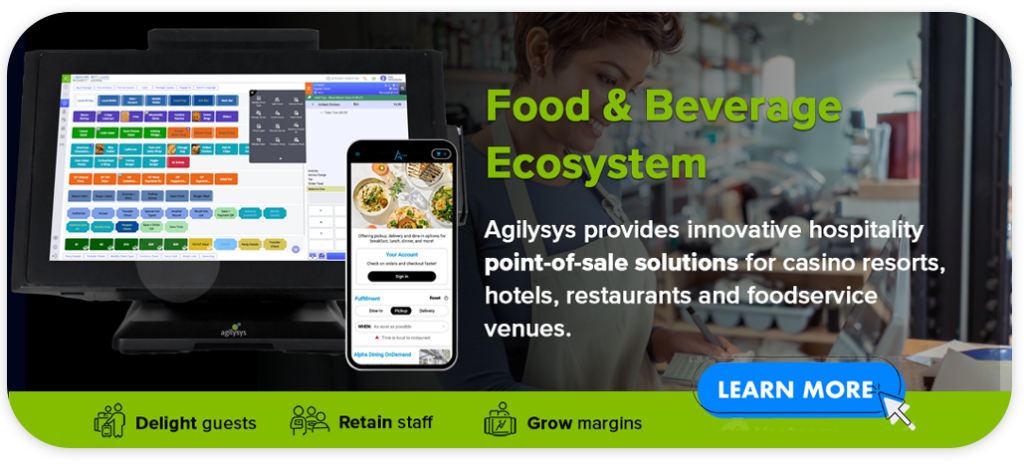
- Solutions
- Food & Beverage Ecosystem
Food & Beverage Ecosystem
Optimizing food & beverage operations and profitability demands a flexible, enterprise-class point-of-sale system. Is yours up to the task?
Go- Hospitality & Leisure Ecosystem
Hospitality & Leisure Ecosystem
From an individual location to an enterprise chain, get the most modern, mobile solution for managing your hospitality business
Go
- Inventory & Procurement Ecosystem
Inventory & Procurement Ecosystem
Designed to optimize foodservice and retail inventory and procurement operations for hotels, resorts, universities, restaurants and others.
Go
- Professional Services
Professional Services
Hospitality businesses are global, 24/7 operations with complex technology demands. You don’t have to go it alone.
Go
- Solution Studios
- Hotels
Hotels
Whether you operate a single boutique location or a large hotel chain, there’s an Agilysys hotel solution for you.
Go- Resorts
Resorts
Whether you operate a single boutique location or a large complex resort, your property is a unique operation that requires robust solutions supported by an experienced technology partner
Go
- Casinos
Casinos
You’re more than a gaming operation. You’re a full-service casino resort property and success isn’t about playing the odds, it’s about making the most of every revenue opportunity.
Go
- Tribal Gaming
Tribal Gaming
A leader in casino hospitality management solutions who respects the sovereignty of your nation.
Go
- Cruise Lines
Cruise Lines
Smooth seas ahead: technology solutions from Agilysys, a leader in cruise management systems.
Go
- Higher Education
- Corporate Dining
Corporate Dining
Identify emerging dining trends while aligning coverage with demand and capturing more revenue.
Go
- Healthcare
Healthcare
Delight patients & visitors, retain staff and grow margins with a suite of hospitality solutions for healthcare environments.
Go
- Life Plan Communities
- Foodservice Management
Foodservice Management
End-to-end foodservice management software solutions for optimum productivity and profitability.
Go
- Stadiums
- Restaurants
- Airports
Airports
Optimizing dozens of food & beverage outlets throughout your facility demands world-class POS performance combined with real-time operating insights.
Go
- Resorts
- Resources
- Articles
Articles
Access our library and read about the latest in emerging technology and other hospitality trends. Find tips and insights on accelerating business growth and improving guest satisfaction.
Go- Customer Stories
Customer Stories
Learn why so many businesses, small and large, partner with Agilysys for their hospitality technology needs.
Go
- Customer Videos
Customer Videos
Watch and learn what Agilysys customers have to say about their experiences with our solutions.
Go
- Product Resources
Product Resources
An in-depth collection of product information and datasheets. Read about the latest in hospitality technology features designed to solve the challenges faced by hospitality professionals around the globe.
Go
- Product Showcase
Product Showcase
Hear from industry professionals about the latest advancements, including tips and tricks, in hospitality and emerging technologies. Check out the library of demo videos and webinar recordings.
Go
- Webinars
Webinars
Watch and learn about the latest in successful technology trends and hear from hospitality professionals in this selection of interactive videos.
Go
- Industry Reports
Industry Reports
Important research and studies from across the hospitality industry. Find out what thought leaders are saying.
Go
- Customer Stories
- Company
- Leadership
- Solution Partners
Solution Partners
Agilysys has a broad collection of partners and APIs to help you assemble the perfect solution for you.
Go
- Our Customers
Our Customers
Discover how Agilysys customers like you are using our solutions to improve their business and guest experience.
Go
- Investor Relations
- News
- Events
Events
With the Agilysys commitment to 100% Hospitality solutions, we take industry events and conferences seriously. Please see where you can find Agilysys to learn more.
Go
- Career
- FAQS
FAQS
Go
- Solution Partners
- Support
- Contact Support
- Microsoft Patch Testing
Microsoft Patch Testing
See what Microsoft products and versions are currently support by Agilysys.
Go
- Payment Center
- RMA Requests
- Supply Order
Supply Order
Go
- Hospitality IQ
Hospitality IQ
Go
- Knowledge Center
Knowledge Center
Go
- Microsoft Patch Testing
- Blogs
- MyAgilysys
-
 Get a Demo
Get a Demo 877 369 6208
877 369 6208
×Home
☰- Explore
WHAT'S THE BUZZ IN HOSPITALITY?
A Complete Guide to Central Reservation Systems for Hotels
In the highly competitive hospitality industry, efficiency and convenience are crucial to success. A Central Reservation System (CRS) is one of the most important tools for hotels to stay competitive, streamline operations, and maximize revenue. It plays a pivotal role in ensuring that hotels manage their bookings, optimize occupancy rates, and provide a seamless guest experience. In this guide, we’ll explore what a hotel CRS is, how it works, the key features to look for in hotel CRS systems, and how it benefits hotels in the modern hospitality environment.
What is a Central Reservation System (CRS)?
A Central Reservation System (CRS) is a software platform that allows hotels to manage and centralize their reservations and bookings. The CRS acts as the hub for all reservation-related tasks, including room availability, pricing, and guest data management. It integrates with other hotel systems, such as the Property Management System (PMS), Point of Sale (POS), and distribution channels like OTAs (Online Travel Agents), global distribution systems (GDS), and hotel websites.
In essence, a CRS is designed to give hotel operators control over their booking channels, helping them to increase visibility, improve operational efficiency, and optimize revenue. By centralizing reservations in one system, hotels can avoid overbookings, reduce human error, and provide a better experience for both guests and staff.

How Do Hotel CRS Systems Work?
Hotel CRS systems work by consolidating reservations and distributing them across multiple sales channels in real-time. When a guest books a room, the reservation details are entered into the CRS, which then updates availability and pricing across all distribution channels connected to the system. This ensures that all sales channels, such as the hotel’s website, OTAs, and travel agents, have accurate information on room availability.
A CRS typically includes the following components:
- Room Inventory Management: Tracks room availability in real-time, ensuring that all bookings are accurately reflected across different channels.
- Pricing and Revenue Management: Enables dynamic pricing, adjusting room rates based on demand, seasonality, and competitor pricing.
- Guest Profile Management: Stores guest data, preferences, and booking history for future marketing and customer relationship management.
- Reporting and Analytics: Generates insights into booking trends, revenue, occupancy rates, and channel performance, helping hotels make data-driven decisions.
The CRS integrates with various external sales channels, including OTAs like Expedia or Booking.com, to ensure that room availability is updated in real-time across all platforms. This reduces the need for manual intervention and avoids the possibility of double-bookings, allowing hotel staff to focus on guest service and operational tasks.
Key Features to Look for in Hotel CRS Systems
When selecting a hotel CRS, it’s important to consider the features that will best serve your hotel’s needs. Here are some key features to look for:
1. Channel Management Integration
A hotel CRS should seamlessly integrate with various distribution channels, including OTAs, GDS, and metasearch engines. Channel management ensures that your hotel’s availability, pricing, and inventory are automatically updated in real-time across all online platforms. This integration reduces the risk of overbookings and ensures your hotel is always visible to potential guests.
2. Real-Time Data and Booking Synchronization

A reliable CRS should provide real-time synchronization of data, so any changes in pricing or availability are reflected instantly across all channels. Real-time updates help ensure that your hotel is maximizing its occupancy potential by making it easier for guests to book rooms without encountering any discrepancies.
3. Dynamic Pricing and Revenue Management
One of the most important features of a hotel CRS is its ability to optimize pricing through dynamic pricing and revenue management tools. These systems use algorithms to adjust room rates based on real-time demand, local events, market conditions, and competitor pricing. By using data to adjust pricing automatically, hotels can maximize revenue, especially during peak seasons or events.
4. Guest Profile Management
Advanced hotel CRS systems allow hotels to store detailed guest profiles, including personal preferences, past bookings, and special requests. This data can be used to tailor guest experiences, offer personalized promotions, and create loyalty programs that encourage repeat bookings.
5. Reporting and Analytics
Hotel CRS systems provide detailed reporting tools to track key performance metrics like occupancy rates, average daily rate (ADR), and revenue per available room (RevPAR). By analyzing these reports, hotel managers can gain insights into their booking trends, adjust marketing efforts, and identify areas where they can improve operational efficiency.
6. Mobile and Cloud-Based Access
Modern CRS systems offer cloud-based and mobile capabilities, allowing hotel operators to manage reservations from anywhere, at any time. Cloud-based systems are particularly valuable for multi-property groups or hotels that need to access data remotely. Mobile access allows on-the-go management, which is especially useful for hotel managers who need to check availability or adjust pricing while away from the front desk.
Benefits of Using Hotel CRS Systems
Adopting an advanced hotel CRS can provide several benefits to hotels looking to improve operational efficiency and enhance their guest experience. Here are some of the key advantages:
1. Increased Efficiency and Automation
By centralizing reservations and automating tasks such as inventory management, pricing adjustments, and reporting, hotel CRS systems eliminate the need for manual input. This automation reduces the chances of human error and frees up time for hotel staff to focus on guest service.

2. Improved Revenue Management
Dynamic pricing and real-time booking synchronization allow hotels to optimize their revenue potential. By adjusting rates based on demand and market conditions, hotels can maximize their occupancy during high-demand periods and avoid underpricing during slower times.
3. Better Customer Experience
A hotel CRS helps ensure that guests have a smooth and hassle-free booking experience. With real-time availability updates, guests are less likely to encounter booking errors or overbookings. Additionally, the guest profile management feature allows hotels to offer personalized services, improving overall guest satisfaction.
4. Enhanced Market Visibility
With a CRS integrated with distribution channels such as OTAs, GDS, and metasearch engines, hotels can increase their visibility and reach a broader audience. A wider presence across multiple booking channels translates to more booking opportunities and ultimately higher revenue.
5. Data-Driven Decision Making
A hotel CRS provides managers with valuable insights through detailed analytics and reports. This data can be used to make informed decisions about pricing, promotions, marketing strategies, and resource allocation, helping the hotel stay competitive in a rapidly changing market.
Conclusion
As the hospitality industry continues to evolve, hotel CRS systems have become an essential tool for hotel operators seeking to streamline their operations, maximize revenue, and improve the guest experience. With features like dynamic pricing, real-time booking synchronization, and seamless integration with distribution channels, a hotel CRS helps businesses stay competitive and efficient in an increasingly digital marketplace. By choosing the right system, hotels can enhance their operational efficiency, improve guest satisfaction, and achieve long-term success in the ever-evolving hospitality landscape.

2026 Hospitality Industry Conferences You Shouldn't Miss
Read More
The 2025 Global Hospitality Study
Download Study
The Guest Economy: Top 5 Hospitality Technology Predictions for 2026
Learn MoreCategories
- Contact Support
- Leadership
- Articles
- Hotels
- Food & Beverage Ecosystem




